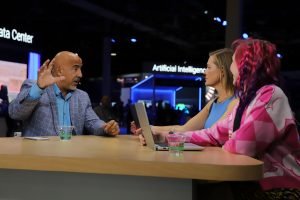U.S. semiconductor technology stocks fell around 3% on news of Alibaba chip’s own development
China is becoming self-reliant in artificial intelligence (AI) semiconductors.
Following Alibaba’s own development of AI chips and DeepSeek’s decision to introduce Huawei chips, China’s strategy to reduce its dependence on the U.S.-centered AI technology ecosystem is becoming clearer.
According to the Wall Street Journal (WSJ) on the 29th (local time), Alibaba has completed the development of a new chip specialized in AI inference work and has entered the trial stage of applying it to cloud data centers.
The new chip is highly compatible with Nvidia’s “CUDA” platform, so it can be applied without almost touching the existing code.
In particular, it has a symbolic meaning of technology independence as it takes place in foundry in China from design to production. Alibaba plans to install the chip in its cloud infrastructure and provide it in the form of a rental service.
When the news broke, the global stock market reacted immediately.
Nvidia shares fell more than 3% on the New York Stock Exchange, while Alibaba shares surged 12% on the Hong Kong Stock Exchange, coupled with strong earnings.
Just as the term “deep shock” came out in January when Chinese AI start-up DeepSeek announced that it had implemented performance comparable to ChatGPT at low cost, this time even the term “Alibaba shock” appeared.

Chinese technology companies are expanding their application of AI chips.
On the 30th, Information Technology (IT) media Deformation reported that DeepSeek will apply some of Huawei’s “Ascend” chips to the next-generation AI model R2 training.
After testing Baidu and Cambricon chips, DeepSeek is said to have finally chosen Huawei. DeepSeek’s strategy is to continue to use Nvidia chips for top-level model training, but to gradually localize by using Huawei chips for medium and small model training.
The AI semiconductor ecosystem in China is rapidly expanding not only to existing big tech but also to professional startups.
Cambricon, dubbed the “Chinese version of Nvidia,” recently expanded its AI chip business for cloud and data centers, securing major customers such as Alibaba, Tencent, and D-Seek. In China, the latest chip performance has reached 80% of Nvidia’s A100, and sales in the first half of this year jumped 4,000% year-on-year.
Another AI semiconductor startup, Birn Technology, is preparing to list on the Hong Kong stock market in June by raising 1.5 billion yuan (about 280 billion won) from local government funds and the Shanghai city government.
Although Veran was hit by U.S. regulations in 2023 that blocked TSMC production, it has since used Chinese foundry to supply products and provide chips to large customers in China such as China Mobile and China Telecom.
There are currently no accurate statistics on AI chips produced in China, but according to Reuters, the Chinese government is pursuing a plan to more than triple them by next year. “There are concerns that China could compete with Nvidia in the global market by developing its own chip competitiveness,” Deformation analyzed.
The fierce war of nerves between the U.S. and China over AI chips is reminiscent of the U.S.-China semiconductor war that began in 2018.
In 2018, the U.S. government blacklisted Huawei for export restrictions, blocking access to semiconductors and software, and Huawei was directly hit by blocking supply of advanced chips from TSMC.
The U.S. slowed down China’s development of advanced semiconductor manufacturing capabilities and accelerated its pace to rebuild its semiconductor manufacturing base in the country. On the other hand, China has not only succeeded in developing its own 7-nano process through its own technology development, but is also reducing its dependence on imports from the United States, Japan, and Taiwan and increasing its share of domestic companies.











































